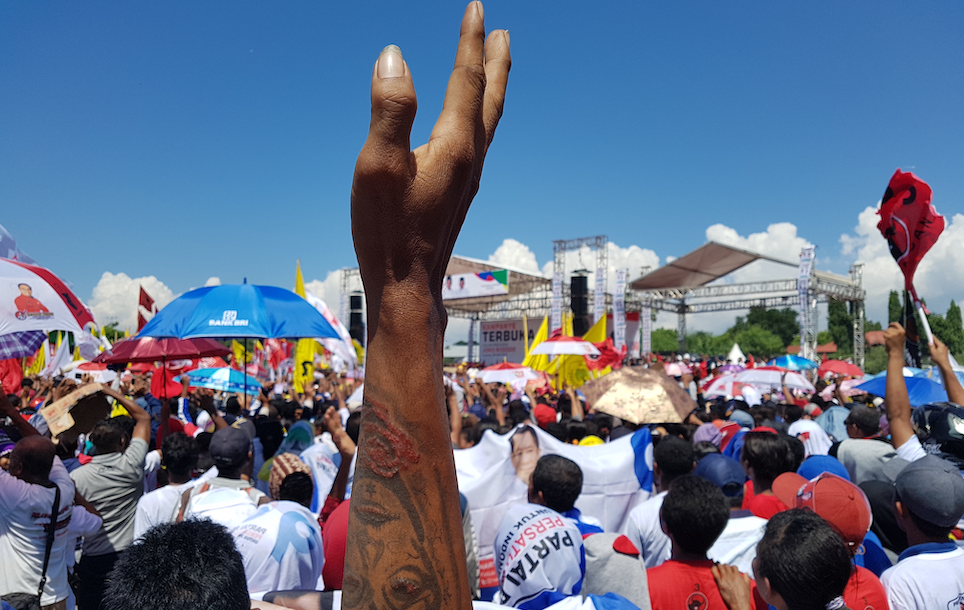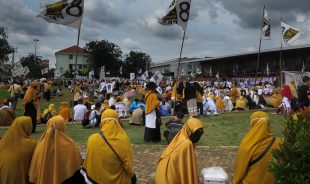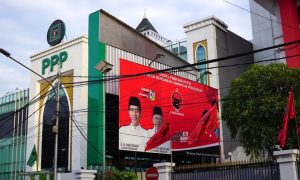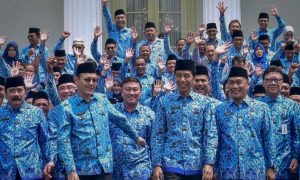No Indonesian president has been such a regular visitor to East Nusa Tenggara (Nusa Tenggara Timur, or NTT) as Joko Widodo. Jokowi has visited this economically disadvantaged eastern province no less than eight times, his latest taking place on 8 April, when around 10,000 people attended a campaign rally in the regional capital of Kupang. In the 2014 presidential election, Jokowi and his then running mate Jusuf Kalla won 65.92% of the vote in NTT; out of 21 districts and 1 city in the province, Jokowi-JK won in 19 districts and 1 city, while Prabowo Subianto and Hatta Rajasa only won in 2 districts, Kupang and Belu.
During my recent visit to Timor, it became clear why on Wednesday Jokowi is likely to fare even better in NTT than he did in 2014. The messages from Jokowi’s event in Kupang were relatively standard. One of the speakers said, “we must vote for Jokowi as he has established several infrastructure projects in NTT.” Another claimed, “if Pak Jokowi wanted to secure his political power, he will only establish Java as the majority of voters in Indonesia. But because he himself is a poor person (orang susah), he knows our needs in NTT. He does want to build from the periphery such as NTT”. Another message was “Don’t go back to New Order era. Please vote number 1, Jokowi-Amin.”
Jokowi spoke for only 15 minutes, greeting his supporters with Kupang dialect: “bagaimana lu pung kabar? (how are you?) Bae-bae sa ko? (Are you all fine?)”, he said. He vowed to continue to develop infrastructure in NTT, as well as human resources by providing several cards for people to get access to education. There was also promise of a card for ibu-ibu (women) to buy cheaper basic household goods (sembako), and of benefit cards for the unemployed.
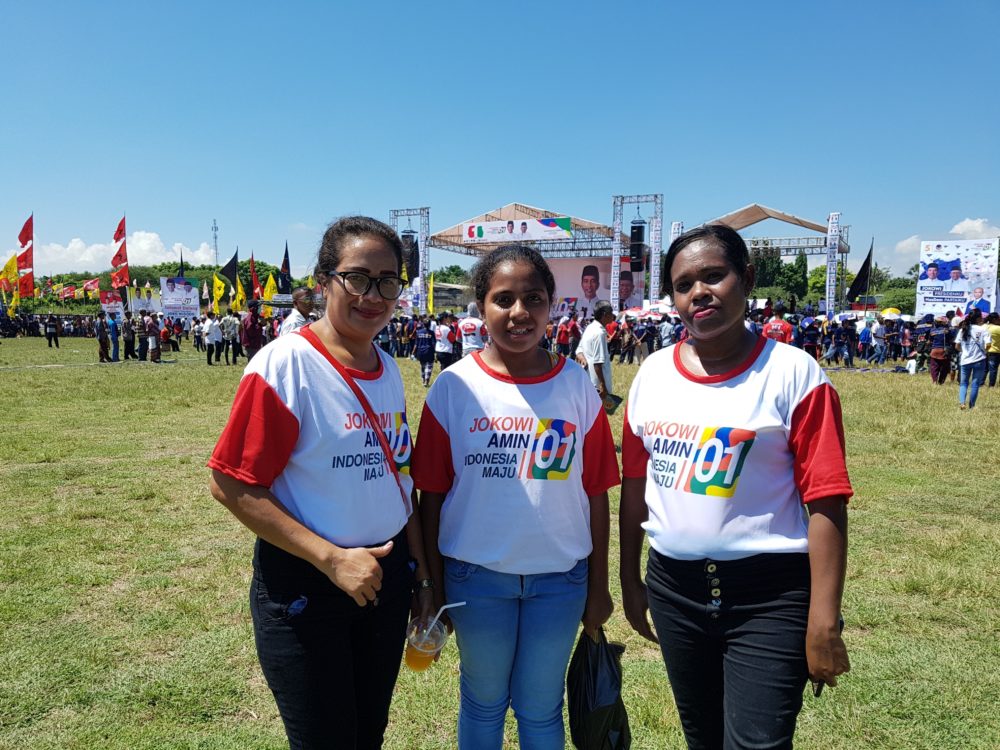
Supporters at Jokowi’s rally in Kupang, 8 April 2019 (Photo: author)
But rather than looking at his messages of infrastructure and the various cards he promises, which I have written about previously at New Mandala, my argument here is that religious identity politics is rising in Kupang and NTT, a majority Christian province. The exploitation of religious identity politics does not occur at big events like Jokowi’s in Kupang. Usually it happens in smaller, localised campaigns without attracting media coverage. The shadow of Jakarta’s 2017 election still looms large in the region, and the rising role of Islamists in Indonesian politics in Jakarta has seen an accompanying intensification of identity politics in Christian communities and their candidates in NTT. Despite all the roads and bridges and health care reforms Jokowi has implemented in his first term, and despite his eight visits and promises to improve poverty and inequality in the region, when we look at the campaign on the ground after the Jakarta-based media flies home with the president, it is identity politics which is most likely to determine people’s votes in NTT on 17 April.
The Ahok effect
NTT is often nicknamed as Nusa Tinggi Tolerasi—the most tolerant province. In 2018, based on the city tolerance index compiled by the Setara Institute, out of 94 cities in Indonesia Kupang was selected as one of the 10 most “tolerant” because of its religious freedom, gender equality, social inclusion based on government laws, and government policies in relation to religious tolerance.
An anti-feminist wave in Indonesia’s election?
Socially conservative female candidates are making their mark in the 2019 legislative elections.
When Ahok lost in the 2017 Jakarta gubernatorial election, there were even calls from some Christians in NTT for Ahok to stand for the NTT governorship in the 2018 regional elections. Politicians such as district leaders and local parliamentarians appeared in public places to show their sympathy with Ahok’s supporters and give comment, which of course had positive implications for their electoral support as the 2018 and 2019 elections approached.
Thus, politicians in NTT know that identity politics can be sold so as to reap electoral support from Christian voters and Ahok’s sympathisers in NTT. Many people said in whispers (bisik-bisik) in 2018, as local elections neared, they they would wait to not vote for Gerindra and PAN candidates in the 2018 local elections to show their revenge.
In February 2018, for instance, I attended a campaign of Andreas Hugo Parera, a senior PDI-P politician, in Lego, a small village in Flores. Parera told the audience:
“We have to vote in the 2019 general election. Do not golput [abstain]. You know, in the 2017 Jakarta gubernatorial election, in all surveys, Ahok won. We all thus believed that Ahok will win the election. But he then lost in the election. This was because people, especially Ahok’s supporters, did not vote in the election. They thought that Ahok could win without their votes. They thus went on vacation to Bali and Singapore. As a result, Ahok lost in the election. We need to learn from Ahok’s case for the 2019 general election. Moreover, today, there is a movement—the movement that has brought Ahok to the prison—to change the president. Not only did the movement want to change the president, but they also wanted to change the basic principle of our nation, Pancasila. People who are supporting this movement see Jokowi as a hindrance of their agenda to change and replace Pancasila. They were furious when Jokowi dispersed HTI. They wanted to establish a Muslim caliphate state of Indonesia […] Therefore, please do not golput.”
Many people in NTT have relatives in Jakarta, who are also sending back information about growing identity politics in the capital. One voter in Flores told me that he often got phone calls from his relatives who are working as civil servants in Jakarta. His relative said: “for national parliament candidates, please, do not vote for Muslim candidates. We are treated badly here in Jakarta. It is much better to vote for our fellow Christian candidates.” Another voter in Flores, a civil servant, told me that the head of her district department—who often went to Jakarta—requested that she and her relatives not vote for Muslim candidates for either the local or national parliament.
In the 2018 NTT gubernatorial election, Esthon Foenay and his running mate Chris Rotok (Esthon-Chris), who were standing with the support of Gerindra and PAN, became the subject of rumours that they supported an Islamic caliphate in Indonesia. Prior to this hoax, a Lingkaran Survei Indonesia (LSI), put Esthon-Chris as having the highest electoral support. However, Esthon-Chris lost in the election on 27 June 2018.
When Viktor Bungtilu Laiskodat and his running mate Yoseph Nai Soi announced their candidacy for the 2018 NTT gubernatorial election in Kupang, the pair produced a letter from Ahok to Yoseph. The letter was read aloud by Ahok’s sister, Vivi Leti Purnama. This pair went on to win the election. Other politicians have since followed this line of using Ahok’s popularity, such as Yohanis Fransiskus Lema, who was Ahok’s spokesman in the 2017 Jakarta gubernatorial election, who is standing for the national parliament (DPR) in an NTT constituency. In his campaigns, he always identifies himself as someone who is close to Ahok.
Identity politics and the 2019 presidential race
Identity politics campaigning has continued in the 2019 presidential elections. Religious colleges are crucial here in NTT, and are in some instances helping Jokowi’s campaign. On February 25 and 26 2019, vice presidential candidate Sandiaga Uno—who was one of Ahok’s adversaries in the 2017 Jakarta gubernatorial election—visited Flores. The Catholic Institute of Philosophy Ledalero (STFK Ledalero), Maumere, Flores—one of the leading, and famous, Catholic colleges that educates candidates for the Catholic priesthood in Flores—refused Sandiaga’s proposal to visit the college. According to Otto Gusti Mandung, the head of STFK Ledalero, Sandiaga was refused because higher education institutions should be free from any political campaigns. However, on January 26 2019, STFK Ledalero welcomed Johnny G. Plate, a senior Catholic politician from the Nasdem party, who hailed Jokowi’s infrastructure projects in his public lecture. One month after refusing Sandiaga’s proposal, on 23 March, STFK Ledalero also welcomed Ignasius Jonan, the Minister of Energy and Mineral Resources, who is a Catholic. Jonan also gave a public lecture on his achievements under Jokowi’s administration.
Realising that they a minority group in NTT, and that intolerant Islamic political movements in Jakarta have affected their constituencies in NTT, some Muslim candidates have been seeking alliances with the Christian majority in NTT. Those Muslim politicians approach Christian religious leaders and show to the public that they are not like the supposedly intolerant Muslims in Jakarta. For example, Anwar Pua Geno, the Muslim speaker of NTT’s provincial parliament (DPRD) from Golkar—who is competing for a DPR seat in Flores in 2019—has sponsored and attended many Christian celebrations in NTT.
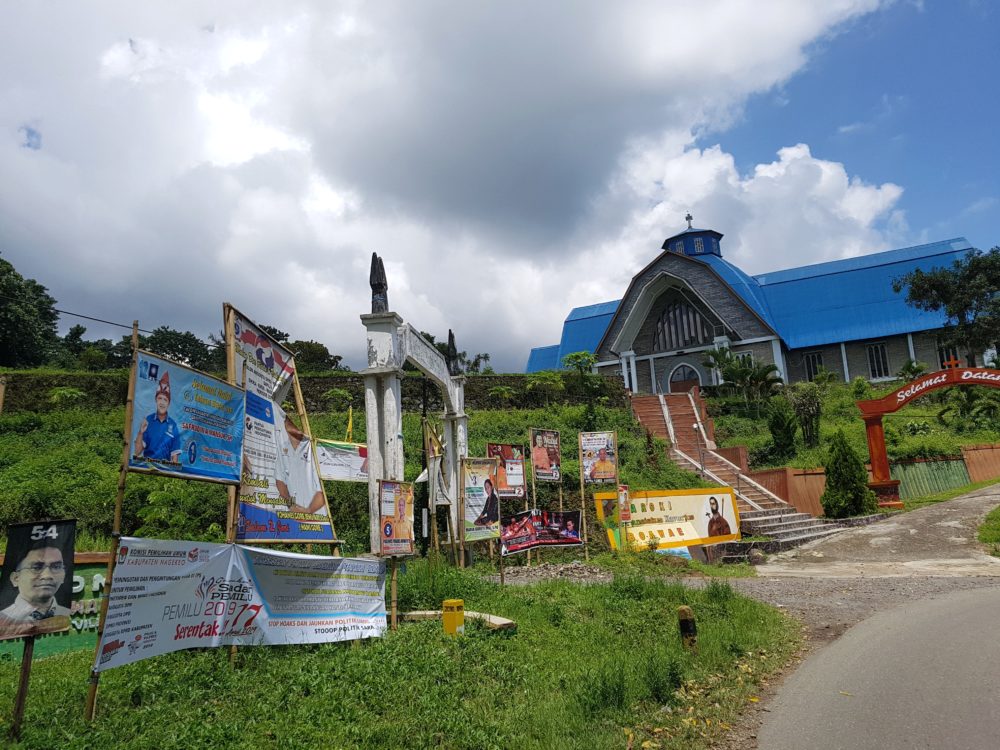
Candidates’ posters in Flores (photo: author)
On his recent research observing the campaign in Maluku, Marcus Mietzner observed that religion, tribes, family networks, and candidates’ geographical bases play an important role in determining how voters cast their votes. As religions and tribes have been highly polarised since the 1990s religious conflicts, and the composition of Muslim and Christians is relatively balanced, it has made candidates reluctantly to use national figures such as Jokowi/Ma’rufAmin and Prabowo/Sandiaga Uno in their campaigns as it can contribute negatively to their electoral support—that is, Muslims tend to vote for Prabowo-Sandi and Christians are inclined to vote for Jokowi-Amin. Thus, instead of selling national figures such as Jokowi-Amin and Prabowo-Sandi, the candidates tend to sell their links to local notables to gain electoral support.
In NTT, the same trend is evident. People here also tend to vote based on their family, religious, and geographical affiliations. But in NTT, which, in contrast to Maluku, is predominantly a Christian province, selling national figures such as Ahok and Jokowi is an effective way to reap electoral support. Thus, even without instructions from their parties, candidates voluntarily put Jokowi, and even Ma’ruf Amin, on their posters. At the same time, candidates from opposition parties, although they may be formally aligned with Prabowo-Sandi, tend not to put their pictures on their posters, and not to promote Prabowo-Sandi during their door-to-door campaigns, as it can harm their electoral support.
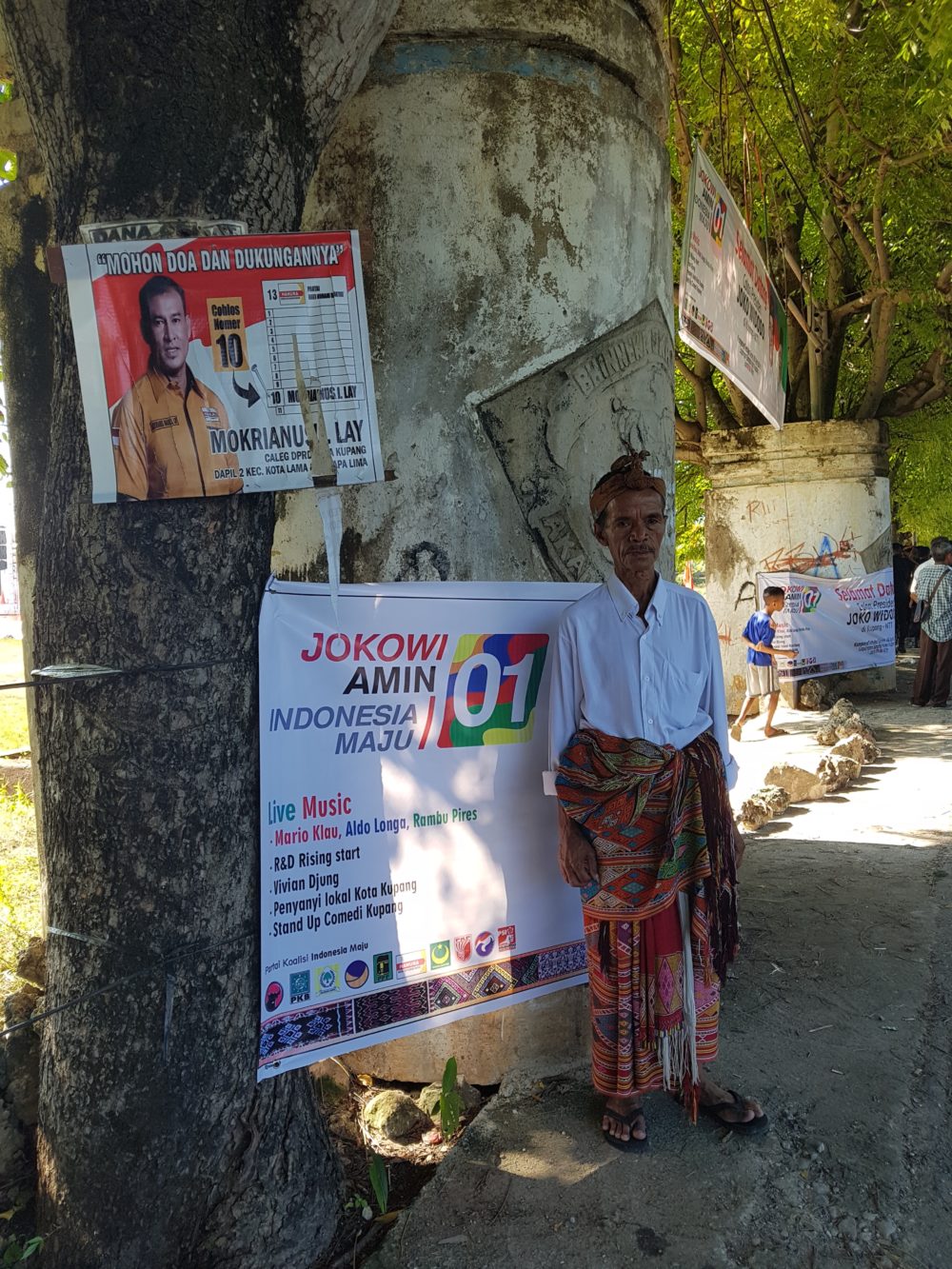
Man and campaign posters, Kupang (photo: author)
Will voters choose identity politics over clientelism?
Amid the growing prominence of identity politics, clientelistic politics also remains rampant in NTT. Incumbent candidates channel social assistance from the government to areas or families that have the highest number of their voters. Clientelism also exists in the form of giving cash to voters: based on my observations in NTT, money politics operates in the form of buying votes from their constituents for Rp50,000–200,000 (A$5–20) each. Money politics in NTT is mostly played by district (i.e. kabupaten) politicians as it is cheaper for them than their national and provincial counterparts. To become a member of a district parliament, a candidate only needs 800-1000 votes, it is thus comparatively affordable to engage in extensive vote-buying. The amount of money required can be borrowed from banks and hundreds of cooperatives in NTT.
As it is much more expensive for them, provincial, and national politicians are less involved in vote-buying unless they are especially affluent. Usually, those national and provincial politicians offer pork-barrel projects, such as establishing public infrastructure, to their prospective voters. In NTT, especially in Timor, clientelism has been an important factor in determining who gets elected to parliament. For example, Setya Novanto— Muslim, Javanese, and very rich—won in his NTT constituency in 2014 due to his skill in playing clientelistic politics. However, the Ahok case and rising conservative Islamic political movements in the past three years have influenced the political choices of NTT constituencies. The 2019 general election in NTT would have a different character and results compared to the previous general elections in the province, where clientelism has been crucial. Politicians who side with Ahok and Jokowi-Amin, and push identity politics for Christians, are likely to reap significant political rewards.
 Facebook
Facebook  Twitter
Twitter  Soundcloud
Soundcloud  Youtube
Youtube  Rss
Rss 